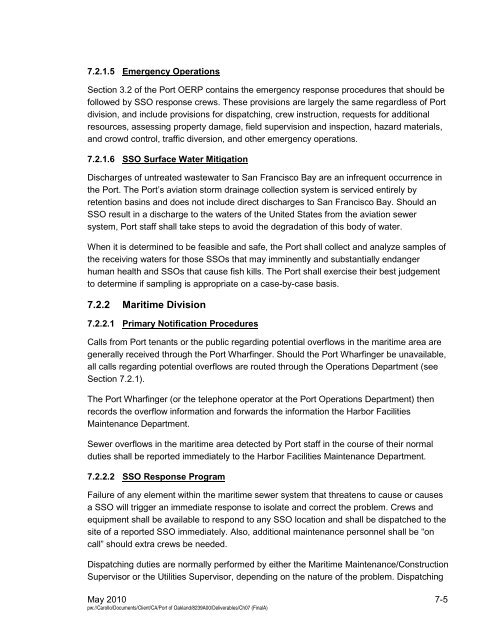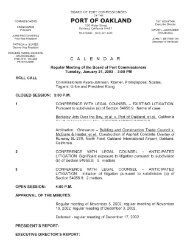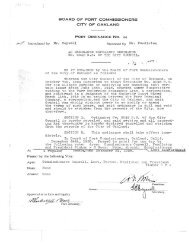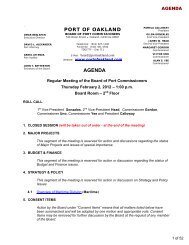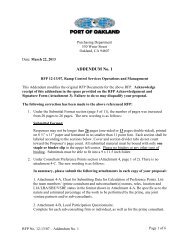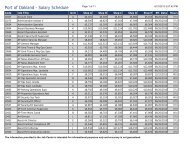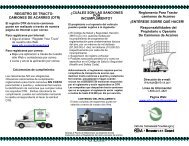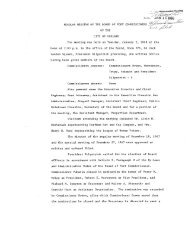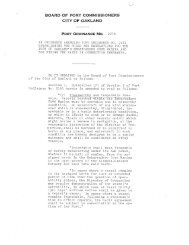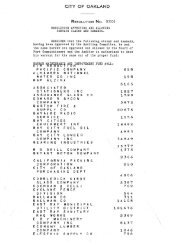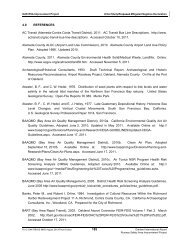Port-Wide Sewer System Management Plan(SSMP) - Port of Oakland
Port-Wide Sewer System Management Plan(SSMP) - Port of Oakland
Port-Wide Sewer System Management Plan(SSMP) - Port of Oakland
You also want an ePaper? Increase the reach of your titles
YUMPU automatically turns print PDFs into web optimized ePapers that Google loves.
7.2.1.5<br />
Section 3.2 <strong>of</strong> the <strong>Port</strong> OERP contains the emergency response procedures that should be<br />
followed by SSO response crews. These provisions are largely the same regardless <strong>of</strong> <strong>Port</strong><br />
division, and include provisions for dispatching, crew instruction, requests for additional<br />
resources, assessing property damage, field supervision and inspection, hazard materials,<br />
and crowd control, traffic diversion, and other emergency operations.<br />
7.2.1.6<br />
Emergency Operations<br />
SSO Surface Water Mitigation<br />
Discharges <strong>of</strong> untreated wastewater to San Francisco Bay are an infrequent occurrence in<br />
the <strong>Port</strong>. The <strong>Port</strong>’s aviation storm drainage collection system is serviced entirely by<br />
retention basins and does not include direct discharges to San Francisco Bay. Should an<br />
SSO result in a discharge to the waters <strong>of</strong> the United States from the aviation sewer<br />
system, <strong>Port</strong> staff shall take steps to avoid the degradation <strong>of</strong> this body <strong>of</strong> water.<br />
When it is determined to be feasible and safe, the <strong>Port</strong> shall collect and analyze samples <strong>of</strong><br />
the receiving waters for those SSOs that may imminently and substantially endanger<br />
human health and SSOs that cause fish kills. The <strong>Port</strong> shall exercise their best judgement<br />
to determine if sampling is appropriate on a case-by-case basis.<br />
7.2.2 Maritime Division<br />
7.2.2.1<br />
Primary Notification Procedures<br />
Calls from <strong>Port</strong> tenants or the public regarding potential overflows in the maritime area are<br />
generally received through the <strong>Port</strong> Wharfinger. Should the <strong>Port</strong> Wharfinger be unavailable,<br />
all calls regarding potential overflows are routed through the Operations Department (see<br />
Section 7.2.1).<br />
The <strong>Port</strong> Wharfinger (or the telephone operator at the <strong>Port</strong> Operations Department) then<br />
records the overflow information and forwards the information the Harbor Facilities<br />
Maintenance Department.<br />
<strong>Sewer</strong> overflows in the maritime area detected by <strong>Port</strong> staff in the course <strong>of</strong> their normal<br />
duties shall be reported immediately to the Harbor Facilities Maintenance Department.<br />
7.2.2.2<br />
SSO Response Program<br />
Failure <strong>of</strong> any element within the maritime sewer system that threatens to cause or causes<br />
a SSO will trigger an immediate response to isolate and correct the problem. Crews and<br />
equipment shall be available to respond to any SSO location and shall be dispatched to the<br />
site <strong>of</strong> a reported SSO immediately. Also, additional maintenance personnel shall be “on<br />
call” should extra crews be needed.<br />
Dispatching duties are normally performed by either the Maritime Maintenance/Construction<br />
Supervisor or the Utilities Supervisor, depending on the nature <strong>of</strong> the problem. Dispatching<br />
May 2010 7-5<br />
pw://Carollo/Documents/Client/CA/<strong>Port</strong> <strong>of</strong> <strong>Oakland</strong>/8239A00/Deliverables/Ch07 (FinalA)


